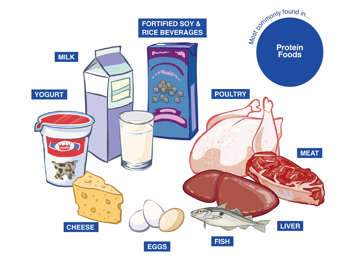What is vitamin B12 and what does it do?
Vitamin B12 works with vitamin B9, also known as folate, to make new cells. Vitamin B12 also helps make healthy blood cells and keeps nerves working properly. It’s also an important nutrient for brain development in babies.
Sources of vitamin B12 and how to get enough
Animal products, such as meat, fish, and eggs, contain vitamin B12. Vitamin B12 is not present in plant foods (apart from some forms of algae), so people on a vegan diet need to obtain it through fortified foods (example: nutritional yeast) and supplements.

How much do we need?
Vitamin B12 recommendations*
| Age | Amount per day (micrograms [µg]/day) |
|---|---|
| Birth – 6 months | 0.4 µg |
| 7 – 12 months | 0.5 µg |
| 1 – 3 years | 0.9 µg |
| 4 – 8 years | 1.2 µg |
| 9 – 13 years | 1.8 µg |
| 14+ years During pregnancy During breastfeeding | 2.4 µg 2.6 µg 2.8 µg |
*These recommendations are presented here simply as a guide to help you make informed food choices.
How much vitamin B12 can I find in a serving of food?
| Examples of food sources | Amount of vitamin B12 (µg) |
|---|---|
| 2.5 oz sardines, canned | 7 µg |
| 2.5 oz beef (lean), cooked | 1.9 µg |
| 2 large eggs, cooked | 1.6 µg |
| 2.5 oz veggie/soy burger | 1.5 µg |
| 1 cup (250 mL) milk | 1.2-1.4 µg |
| 2.5 oz turkey, cooked | 1.0 µg |
Especially important for…
Individuals following a vegan diet and women who are pregnant or breastfeeding
- People who are vegan may not get enough vitamin B12. Vegans require a source of vitamin B12 either from foods fortified with vitamin B12 or a supplement (tablet or liquid).
- Women who are pregnant or breastfeeding need more vitamin B12 than other women. It is recommended to consult your health-care provider.